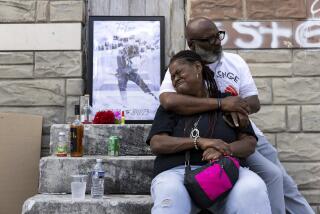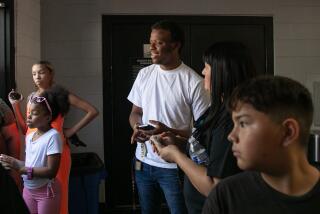Improving Children’s Lives in a Brother’s Name
- Share via
When Darrell Miho’s older brother, Garrett, unexpectedly died in his sleep five years ago of a heart condition at the age of 36, his younger sibling almost immediately decided he needed to start a charity in his brother’s name.
Miho had been involved in volunteer and charity work ever since he joined the Boy Scouts at 10. The only question now was how best to memorialize his brother.
Darrell knew Garrett had loved children, even though he didn’t have any of his own. He had coached a girls basketball team in a Japanese American league and a Little League team with his father in Montebello. He was adored by his friend’s children,who called him “Uncle Garrett.” The stocky warehouse manager would get on his hands and knees to play with the youngsters.
Darrell and Garrett relied greatly on their mother, Ruby, who earned a modest salary for 25 years as a secretary for the Los Angeles Unified School District. When the boys were 11 and 13 years old, their father, a gardener, was injured one day when his leg gave out while pushing a lawnmower up a ramp. Doctors diagnosed him as having deformed vertebrae, and he could no longer work.
Drawing together these memories, Darrell Miho decided he should raise money to support children in single-parent households.
“I have quite a few friends who are single parents, and it amazes me the sacrifices they have to make,” said Miho, a 39-year-old single freelance photographer and graphic designer. “One friend, who remarried, had three kids, 3, 7 and 9 years old. She had to take them to two different schools, go to work, pick them up and take them to their activities. It’s madness.”
On Jan. 19, 2000, Miho and a handful of friends gathered at an Italian restaurant in Pasadena and formed the Garrett Miho Foundation. It now has its own website: www.theGarrettMihoFoundation.org.
Miho describes it as a truly grass-roots organization that overcomes its limited financial resources by taking satisfaction in improving the lives of children, one at a time.
The group held its first fundraiser at a Montebello bowling alley on the one-year anniversary of Garrett’s death. He died on Mother’s Day in 1999. Garrett was a serious bowler who played in several leagues. The event garnered $4,800 in seed money to allow the foundation to start with the business of giving.
First, there was the iMac and printer the group donated to the Asian Pacific Women’s Center in Los Angeles so children of battered women could use a computer.
“The kids were so happy. It was like that MasterCard commercial
Second, the foundation donated $1,500 worth of bilingual textbooks to Para Los Ninos, a service group for poor children in downtown L.A.
Knowing that Garrett loved sports, the foundation often pays league fees so children can participate in athletics. This included a Honolulu girl who attended a volleyball camp last year. Miho, who lives in the same Temple City home he grew up in, has considered Hawaii his second home in recent years.
“A lot of people don’t realize what a disadvantage it is not to have any key role models. I had great role models with baseball and basketball coaches,” said Miho, who often works on photography shoots for Sports Illustrated magazine.
In November 2000, the foundation gave $2,000 to family members of those killed in a shootout at a Xerox warehouse in Honolulu a year earlier. One of Garrett’s best friends worked at the site and by chance missed the meeting at which the gunman opened fire, Miho said.
More recently, the third-generation Japanese American started a toy drive for the Center for the Pacific Asian Family. He took two sisters to a mall to buy clothes and sponsored a Carson girl to take hula lessons for six months beginning in April.
Miho is immersed in volunteer work, be it for his brother’s foundation or other organizations such as the Little Tokyo Service Center, the Pediatric Therapy Network and the Special Olympics.
He said the volunteer community was a tight-knit group that relied heavily on e-mail trees. For example, Miho can contact 500 people over the Internet to mobilize a fundraiser.
“I still get the warm and fuzzies, but I do this so much it seems normal now,” said Miho, wearing a Hawaiian shirt in his cramped office space at home. “I just wish more people would get involved.”
Miho would like one day to organize a mentor program along the lines of a big brother and sister program.
He also envisions a support group for single parents to get together and learn from each other’s experiences.
“I just want to help people understand the needs of others,” Miho said. “I’m not sure where it comes from. Part of it was through Boy Scouts and going to church when I was in high school. My main desire is to help people.”
More to Read
Sign up for Essential California
The most important California stories and recommendations in your inbox every morning.
You may occasionally receive promotional content from the Los Angeles Times.














